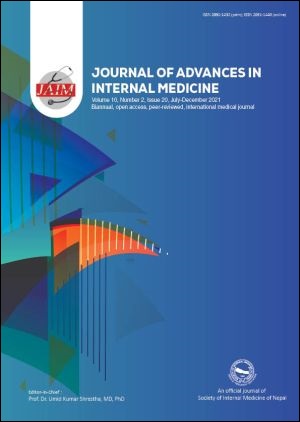The efficacy of combined Albendazole and Praziquantel therapy versus Albendazole monotherapy in treatment of parenchymal neurocysticercosis: A systematic review
DOI:
https://doi.org/10.3126/jaim.v10i2.38477Keywords:
Albendazole, neurocysicerocosis, praziquantelAbstract
Preliminary studies suggest combined albendazole and praziquantel (ABZ+PZQ) therapy has superior anti-parasitic effect compared to albendazole (ABZ) or praziquantel (PZQ) monotherapy, due to potential pharmacokinetic synergism. We thus present an evidence-based review evaluating the risks and benefits associated with combination ABZ+PZQ therapy compared to standard ABZ monotherapy in the treatment of viable parenchymal Neurocysticercosis (NCC). Our systematic review is based on PRISMA (Preferred Reporting Items for Systematic review and Meta- Analysis) statement. Our primary outcome measure was to compare the efficacy of ABZ+PZQ with ABZ alone for treatment of NCC. Efficacy was determined based on clinical and radiographic evaluation. The secondary outcome measured the incidence of adverse effects in each treatment group. Literature search yielded a total of 120 articles. After excluding duplicates and those not meeting inclusion criteria, five papers were reviewed for data collection. Medication regimens, number of cyst, patient age, and location varied amongst included papers. The combination therapy resulted in significant symptom and cyst resolution in patients with more than two viable parenchymal cysts as compared to monotherapy. The two treatment arms were comparable in treating NCC with low cyst burden. There was no significant difference in the adverse effects between two treatment groups. In individuals with multi-cystic NCC, the patients who received dual therapy had better outcomes than those who received ABZ monotherapy as evidenced by radiographic improvement and reduced seizure episodes. The adverse effect profile in patients receiving dual therapy was similar and comparable to those with monotherapy.
Downloads
Downloads
Published
How to Cite
Issue
Section
License
Copyright (c) 2021 Gaurav Nepal, Jessica Holly Rehrig, Rajan Sharma Kandel, Shaik Tanveer Ahamad, Bipin Kandel, Rajeev Ojha, Jayant Kumar Yadav, Sujan Jamarkattel, Ravi Shah, Jeevan Gautam, Gentle Sunder Shrestha

This work is licensed under a Creative Commons Attribution 4.0 International License.
This license enables reusers to distribute, remix, adapt, and build upon the material in any medium or format, so long as attribution is given to the creator.




